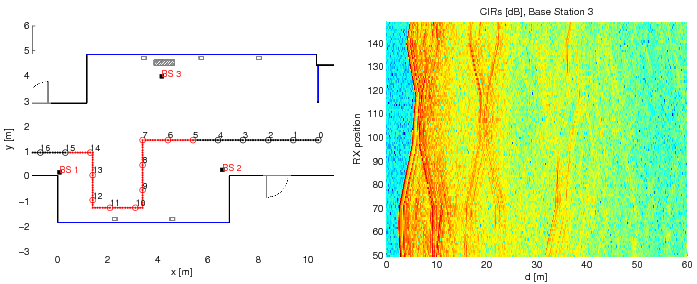Estimation of Reflected Signal Paths for Ultra-wideband Channels
- Status
- Finished
- Type
- Master Project
- Announcement date
- 09 Nov 2010
- Student
- Markus Froehle
- Mentors
- Paul Meissner
- Research Areas

For conventional two-dimensional localization schemes, at least three anchor nodes (transmitters at known locations) are needed to estimate the position of a receiver. In a recent publication, we have shown that accurate localization of a UWB receiver is possible using only a single anchor node together with the reflections of the UWB signal at reflecting surfaces of the room. A key task in this scheme is the estimation of multipath components that correspond to deterministic reflections of the transmitted signal, which is the objective of this thesis. To this end, we have measured a collection of UWB channel impulse responses along an indoor pedestrian motion trajectory. Within this thesis, these and possibly additional new measurements shall be analyzed.
Finished Project Report
The report can be found here. The results were also published at the International Conference on Ultra-Wideband in 2011:
- Fröhle, M.; Meissner, P.; Gigl, T. and Witrisal, K.: _Scatterer and Virtual Source Detection for Indoor UWB Channels,_IEEE International Conference on Ultra-Wideband, 2011
Your Tasks:
- Literature survey of existing multipath extraction algorithms, e.g. [1]
- Matlab implementation of algorithms using existing and possibly new measurement data
- Extension with known room geometry and specialized algorithms
Your Profile/Requirements
- Motivation and interest in radio propagation channels and signal processing
- Mobile Radio Systems lecture is recommended (could be done during thesis)
- Matlab programming
References:
[1] T. Santos, J. Karedal, P. Almers, F. Tufvesson, and A. Molisch, “Modeling the ultra-wideband outdoor channel: Measurements and parameter extraction method,” IEEE Transactions on Wireless Communications, 2010.
